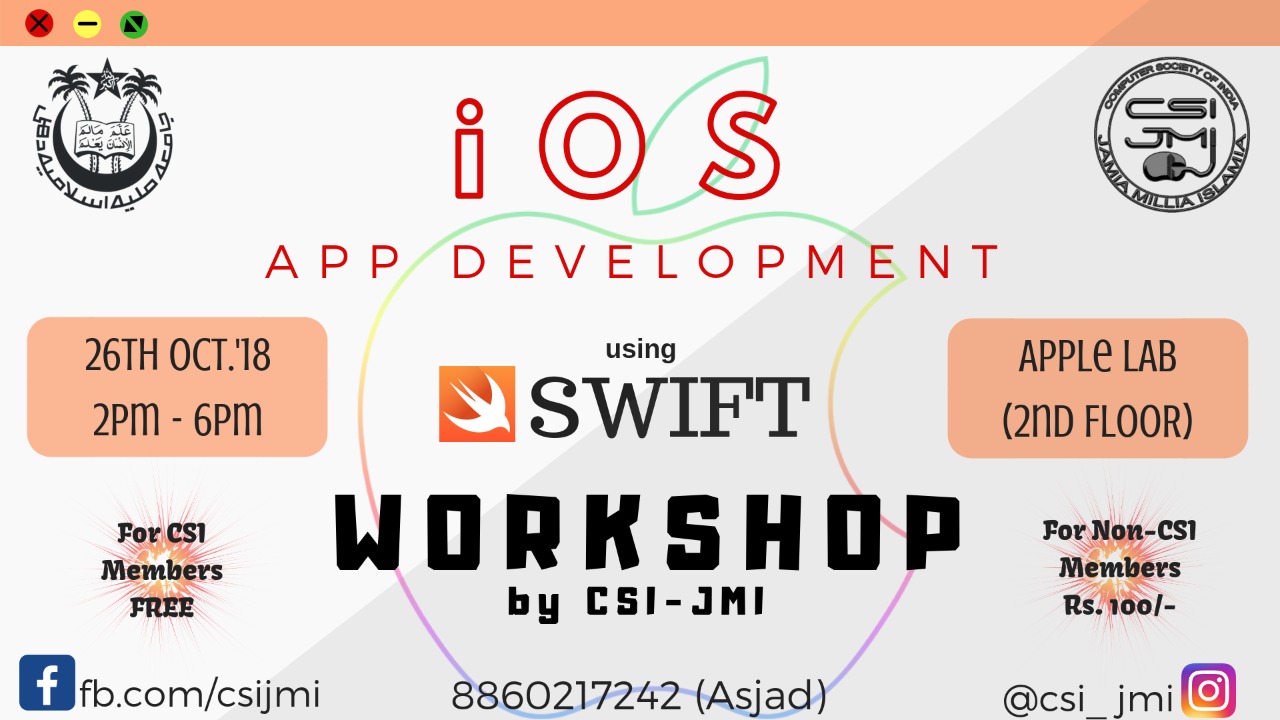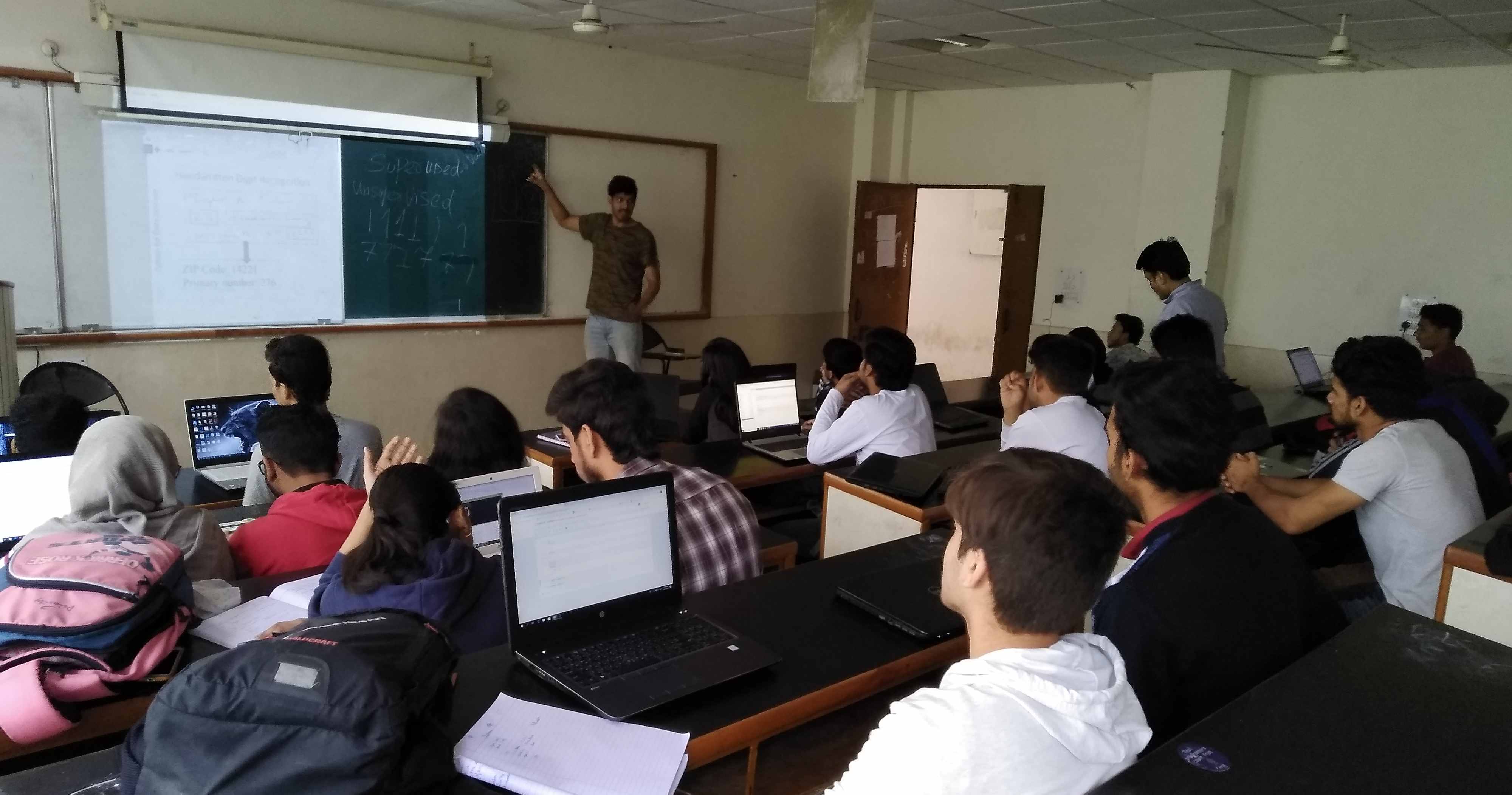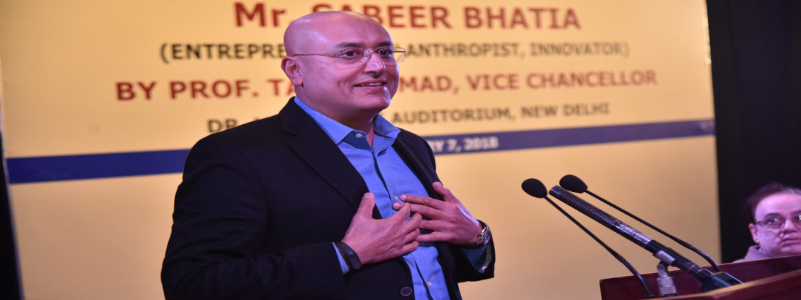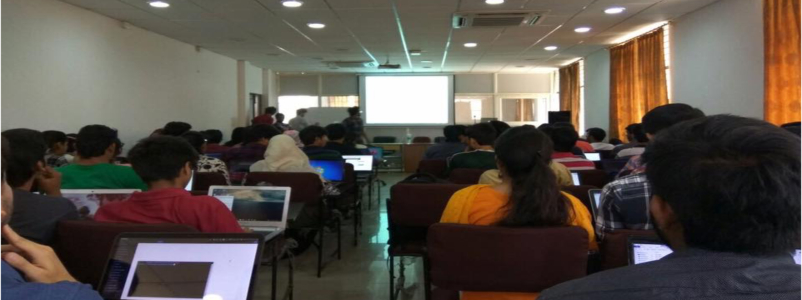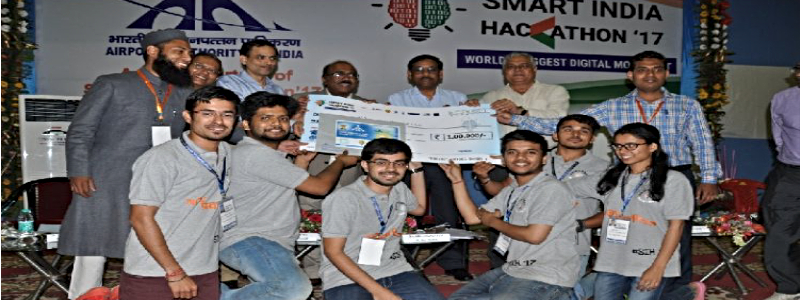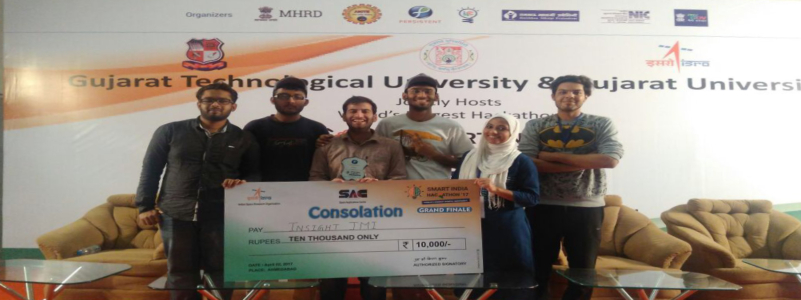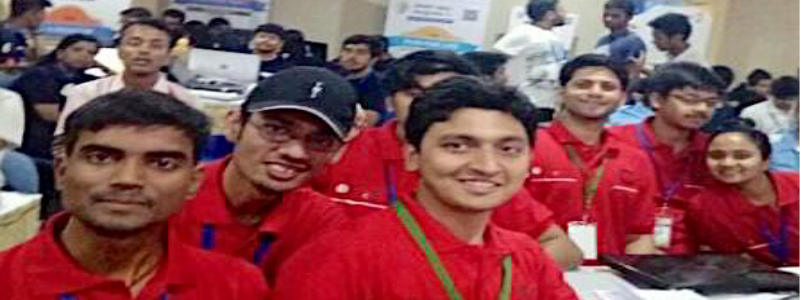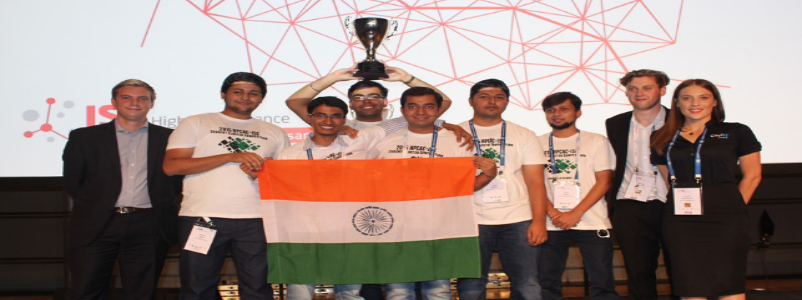Open MIc Competition
CSI-JMI organized "Open mic" on 27th September, 2018, where anyone could showcase their knowledge/ experiences/ talent, and get a chance to express themselves, on a topic of their interests (cultural, technical, literary, political, etc.). It helped the students grow, analyze their strengths and weaknesses about public speaking, develop their personalities and enhance leadership qualities in them. Best participant has been promised a chance to perform in "Spring Fest Jamia '19" organized by CSI-JMI in the month of March, along with a cash prize.
Workshop on iOS App Development
CSI-JMI in collaboration with Skill Campus brought one of a kind work shop on iOS App Development, on 26th October, 2018. iOS App Development is amongst the most popular skills in the industry presently. iOS apps are developed with Swift and objective C. The workshop was successful with the huge response received from the students.
Workshop on Basics of Machine Learning
CSI-JMI organized a workshop on "Basics of Machine Learning" on 21st and 22nd November, 2018. Machine Learning is one of the most discussed and rapidly emerging topics in the field of computer science. The topics covered were Applications of ML, Pandas, SKLearn, Decision Tree Classifier, and Linear Regression.
Omnicron 2018 : Competitive coding competition
CSI-JMI organized Omnicron 2018, on 4th October, an online competitive programming contest for everyone. It was a great opportunity to showcase one’s knowledge of programming and coding skills to the world, with the additional incentive of cash prizes too.
Workshop on C Basics & Data Structure for Beginners
CSI-JMI started the academic year 2018-2019 with a basic workshop on C and Data Structures. Students who hadn’t started learning programming by then, availed the benefit of it. The basic concepts of programming in C were taught, along with basic data structures like arrays, stack, queue and linked list. Recursion and Tree Data structure were also taught through java.
JMI Honours Hotmail Founder Sabeer Bhatia
It was an enterprising atmosphere at Jamia Millia Islamia, with the presence of Hotmail founder Sabeer Bhatia at Dr M A Ansari Auditorium, where he was conferred with the University’s highest award ‘Imtiaz-e-Jamia’. Mr Bhatia, 50, was honoured for his ‘outstanding contributions to public service throughout his life’.
‘Imtiaz-e-Jamia’ was instituted to identify exemplary Indians across the globe and give due recognition to them for contributions towards the betterment of the society.
Prof Talat Ahmad, Hon’ble Vice Chancellor, JMI presented the renowned entrepreneur, philanthropist and innovator with a plaque with the citation and a shawl.
Mr Sabeer Bhatia is celebrated internationally for creating the email service Hotmail, which was subsequently sold off to Microsoft in 1998. Speaking on the occasion, Mr Bhatia gave an electrifying talk on the importance of risk taking and innovation while treading the entrepreneurial path. A knowledge powerhouse in the field of Information Technology, Mr Bhatia enlightened the students on the future of it, stressing primarily on the domains of Internet of Things (IoT) and Artificial Intelligence.
“AI is the future as machines and superior algorithms will outdo human intelligence. However, algorithms may have more accuracy, they lack the emotions human beings can express”, said Bhatia.
15th National Conference
We are grateful to inform that the 15th National Conference of Engineering Council of India (ECI) on the Theme: ‘Preparing Engineers/Technologists for Role in Industry’ which was held on November 10, 2017 at New Delhi was very successful, attended by 25 participants, from JAMIA MILLIA ISLAMIA (Faculty Of Engineering And Technology). It was inaugurated by Dr. Satya Pal Singh, Hon’ble Minister of State for Human Resources Development (Higher Education). The support to Engineering Council of India is greatly appreciated by all, including the member associations of professional engineers. It has helped ECI in a great measure in furthering its objectives to strengthen the engineering profession in the country so as to better serve the industry and economy.
Objective :
For accelerated economic growth, massive investments are needed in all sectors. Industry and corporates will require engineers/technologists in large numbers. As several studies have shown, most of the engineers/technologists passing out from technical institutions do not have practical skills to take up jobs in industry and require pre-job training. Many companies have to deploy large amount of funds, time and internal resources in locating, recruiting, training and in trying to retain talent in the absence of availability of 'industry ready' manpower directly from academic institutions in adequate numbers and quality. All India Council for Technical Education (AICTE) has recently decided that, starting from 2017-18, the engineering students should undergo internship training before taking up jobs, in a manner somewhat similar to medical graduates, so that they can gain practical skills and experience and suitably fit in the desired roles in industry. For this purpose, a major initiative has been taken by AICTE by partnering with Engineering Council of India (ECI) in this regard so that the quality of graduates could be enhanced and thereby their employability. ECI & AICTE have entered into an MoU, for providing “Internship” to the students in all disciplines of technical education to enable them to become employable. ECI shall be facilitating hands-on training/internship for these graduates through its member associations, in their respective stream of engineering. For those engineers/technologists who are already employed, it is important that they undergo Continued Professional Development (CPD) so as to upgrade their knowledge and skills and prepare themselves for required role in the industry. This is necessary in view of rapid technological advancements in all spheres of engineering activities.
Web and Game development Using Ruby on Rails and Django
Bio:
Tushar Tuteja is an acknowledged entrepreneur. He has co-founded ‘Coding Ninjas India’. He is also the co-founder of ‘AtCouch’, an app which allows user to order food any time during the movie. He has previously worked with companies like Times Internet Limited and Taskbob as manager, technology and lead developer respectively. He holds a B.Tech degree from IIT Delhi and has been doing programming since past 10 years.
Abstract:
Learning to build a modern web application is daunting. But Ruby on Rails makes it much easier and more fun. It includes everything needed to build fantastic applications. Ruby on rails is open source and is used to make websites like Basecamp, Github, Shopify, Twitch, Hulu etc. Realizing the above need, HASHes programming club in association with Coding ninjas organized a two day workshop on web and game development using Ruby on Rails and Django. The agenda of the workshop was to enlighten the students with basics of ruby language, create server using Sinatra and then implement the gained knowledge to make something productive. A day before the workshop students from coding ninja helped the students to install ruby, rails and Sinatra. Day 1 began with introduction of ruby as a programming language. A quick glance of datatypes, arithmetic operations, conditions, functions, classes and objects in ruby was given. Later use of Sinatra was brought into action to dynamically update data on server. After touching briefly on these, day 2 was mostly focused on developing a dynamic To-do List. Under the guidance, students made their very first application using Ruby on Rails and were asked to add more innovative features to it.
Teams from Dept. of Computer Engineering, JMI endeavour remarkably in Smart India Hackthon, 2017
Navpravartak
Team from Department of Computer Engineering, Jamia Millia Islamia was declared the winner of “Smart India Hackathon - 2017” at Civil Aviation Training College, Allahabad
A part of Prime Minister Modi’s Digital India Initiative, the Smart India Hackathon focused on the problems of social importance identified by 29 ministries and departments of the government. They identified 598 problems, which 7,531 teams of approximately 42,000 students responded to. Of them, 1,266 teams of 10,000 participants were shortlisted for the finale.The two day event held on April 1 & 2 was aimed at harnessing the creativity and expertise of the students. The ‘Smart India Hackathon 2017’ grand finale concluded on 2nd April, 2017 at 26 locations across the country. A total of three teams participated from of our Department of Computer Engineering, Jamia Millia Islamia.
At the Civil Aviation Training College (CATC), Allahabad, one among 26 locations for ‘Smart Hackathon 2017’, 58 teams from across India participated for the 36 hour event, with students formulating solutions for improving governance and to come up with innovative solutions for India’s daunting problems.On the second day of the event, after three rounds of evaluation, Navpravartak team from Department of Computer Engineering, Jamia Millia Islamia, Delhi was declared winner of the “Smart India Hackathon-2017.”
Insight-JMI
Team from Department of Computer Engineering,Jamia Millia Islamia got the consolation prize in “Smart India Hackathon - 2017” at Gujarat Technological University (GTU), Ahmedabad
The Ahmedabad centre of the nationwide hackathon had ISRO as premier partner that had identified 35 problems areas for the participants to work on. There were 50 teams consisting of six participants with two mentors each who tackled issues such as developing a solution for document tracking within an organization network, developing a solution for protecting photocopy of highly confidential documents, designing a solution to detect physical intrusion detection, and so on. One of the two consolation prizes was achieved by Insight-JMI team from Department of Computer Engineering, Jamia Millia Islamia, Delhi.
MeSHyourWayOut
team from Department of Computer Engineering, Jamia Millia Islamia qualified among top 8 teams in “Smart India Hackathon - 2017” at Indian Medical Research Institute (ICMR), Kolkata Centre
At the Kolkata centre, the government's medical research body Indian Medical Research Institute (ICMR) conducted the grand finale of the hackathon under the aegis of the All India Council for Technical Education (AICTE) under the HRD Ministry in collaboration. The JMI team MeSHyourWayOut from department of Computer Engineering qualified among the top 8 teams at the centre.
Securing Cloud-Assisted Services and IoT Systems
Speaker Profile:
Professor Asokan is a researcher, specialising in systems security. He presently co-leads Secure Systems Group at Aalto University. He also directs the Helsinki-Aalto Center for Information Security (HAIC) and Intel Collaborative Research Institute for Secure Computing in Finland.
He is also a renowned professor at the Department of Computer Science at Aalto University and Department of Computer Science, University of Helsinki.
Previously he has spent his inestimable 17 years in industrial research at the IBM Zurich Research Laboratory (ZRL) and then at Nokia Research Center (NRC). His research interests chiefly focuses on understanding how to build systems that are simultaneously secure, easy to use and inexpensive to deploy. he has initiated and led several projects , co-designed 'simple pairing system' for bluetooth devices, 'generic authentication architecture'. At Zurich, he designed and implemented ' generic payment service framework' for 'Semper Project'.
He has received his former education at IIT Kharagpur , Syracause university and University of Waterloo.
Abstract:
Cloud services covers a wide range of resources that a service provider delivers to customers via the internet. Customers can provision services on an on-demand basis and shut them down when no longer necessary. On-demand computing services can save large enterprises and small businesses a lot of money, but security and regulatory compliance become difficult. He emphasised that these systems may present a variety of potential security risks that could be exploited to harm consumers. He discussed the privacy concerns that arise and how we can address them effectively.
What is cloud service?
A cloud service is any service made available to users on demand via the Internet from a cloud computing provider's servers as opposed to being provided from a company's own on-premises servers. Cloud services are designed to provide easy, scalable access to applications, resources and services, and are fully managed by a cloud services provider.
What is the "Internet of Things"?
IoT can be described as the connection of physical objects to the Internet and to each other through small, embedded sensors and wired and wireless technologies, creating an ecosystem of ubiquitous computing. The IoT includes consumer-facing devices, as well as products and services that are not consumer-facing. The Internet of Things extends internet connectivity beyond traditional devices like desktop and laptop computers, smartphones and tablets to a diverse range of devices and everyday things that utilize embedded technology to communicate and interact with the external environment, all via the Internet.
Risks:
Despite numerous benefits these systems create a number of security and privacy risks.
1. Data Breaches
He cited that the largest breaches haven't involved any such advanced techniques, which remain for the most part lab
experiments. But the possibility still acts as a brake on what is looking like broad enterprise adoption of cloud computing.
Clouds represent concentrations of corporate applications and data, and if any intruder penetrated far enough, who knows
how many sensitive pieces of information will be exposed. Unfortunately, while data loss and data leakage are both serious
threats to cloud computing, the measures you put in place to mitigate one of these threats can exacerbate the other.
Encryption protects data at rest, but lose the encryption key and you've lost the data. The cloud routinely makes copies
of data to prevent its loss due to an unexpected die off of a server. The more copies, the more exposure you have to
breaches.
2. Data Loss
A data breach is the result of a malicious and probably intrusive action. Data loss may occur when a disk drive dies
without its owner having created a backup. It occurs when the owner of encrypted data loses the key that unlocks it.
And a data loss could occur intentionally in the event of a malicious attack.
3. Account Or Service Traffic Hijacking
Account hijacking sounds too elementary to be a concern in the cloud, but it is a problem. Phishing, exploitation of software vulnerabilities such as buffer overflow attacks, and loss of passwords and credentials can all lead to the loss of control over a user account. An intruder with control over a user account can eavesdrop on transactions, manipulate data, provide false and business-damaging responses to customers, and redirect customers to a competitor's site or inappropriate sites.
If your account in the cloud is hijacked, it can be used as a base by an attacker to use the power of your reputation to enhance himself at your expense.
If credentials are stolen, the wrong party has access to an individual's accounts and systems. A service hijacking lets an intruder into critical areas of a deployed service with the possibility of "compromising the confidentiality, integrity, and availability" of those services, the report said.
4.InsecureAPIs
A data breach is the result of a malicious and probably intrusive action. Data loss may occur when a disk drive dies
without its owner having created a backup. It occurs when the owner of encrypted data loses the key that unlocks it.
And a data loss could occur intentionally in the event of a malicious attack.
His recommendations for best practices
Data security
Participants discussed a number of specific security best practices. He encouraged companies to consider these practices:
First companies should implement security by design by buikding security into their devices at the outset , rather than
as an afterthought.in addition. Companies should do a privacy or security risk assessment , consciously considering the
risks presented by collection and retention of cosumer information. Secondly , companies must ensure that their personnel
practices should promote good security. Companies should also train their employees about good security practices recognizing
that technical expertise does not necessarily equate to security expertise. Data minimization. Companies should examine
their data practices and business needs and develop policies and practices that impose reasonable limits on the collection
and retention of consumer data. Data minimization can help guard against two privacy related risks. Companies should
also consider if it could offer same features while collecting less information. With these recommendations on data minimization,
he is mindful of the need to balance future.
Data Sharing
Prof. offerered tips on how to practice defense in depth against hijackings, but the must-do points are to prohibit
the sharing of account credentials between users, including trusted business partners; and to implement strong two-factor
authentication techniques "where possible."
Conclusion
The cloud services and internet of things presents numerous benefits to consumers and has potential to change the ways that consumers interact with technology in fundamental ways. In future these systems are likely to meld the virtual and physical worlds together in ways that are currently difficult to comprehend. From a security and privacy perspective these bodies pose particular challenges. As physical objects in our everyday lives increasingly detect and share observations about us, consumers will likely want privacy. The designated commission will continue to enforce laws, educate consumers and businesses, and engage with industry and academics to promote appropriate security and privacy protections. At the same time, he urged further self-regulatory efforts on IoT, along with enactment of data security and broad based privacy legislation.
4th HPCAC-ISC STUDENT CLUSTER COMPETITION 2015
Team Name : Jamia Millia Islamia University
Team Members : Vipul Nayyar, Umar Ahmad, Deepanshu Bhatia, Akif Khan Yusufzai, Moonis Javed, Md Safiyat Reza
Advisor : Dr. Bashir Alam, Mr. Umesh Gupta
Team Sponsors : Boston Ltd., RSC-Tech, Syncthreads Computing
The 4th HPCAC-ISC Student Cluster Competition was held in Frankfurt, Germany, where more than 2,600 attendees and 160 exhibitors from around the globe met in an opportunity to showcase student expertise in a friendly yet spirited competition.
The JMI team was the first to represent an Indian university. It harnessed Boston's latest technology in a set of complex challenges amongst students from all over the world. The team went head to head against 10 other teams and using Boston hardware optimised a small cluster of their own to demonstrate the greatest performance across a series of benchmarks and applications with a strong focus on energy efficiency.
JMI won the LINPACK award with a record breaking score of 10.78 teraFLOPS which translated into an energy efficient 3.59 teraFLOPS per kilowatt, enough to achieve an estimated rank of 6 on the Green500, a list of the most energy efficient supercomputers in the world. JMI have beaten the 10.18 Tflop record previously set by 2014 team EPCC from the University of Edinburgh.
The JMI team were equipped with a high performance Boston GPU cluster fitted with a Rack DCLC AHx20 liquid cooling solution from CoolIT Systems. The system consisted of four 1U Boston Venom servers, each utilizing two Intel Xeon "Haswell-EP" processors, two NVIDIA K80 Tesla GPUs and Mellanox EDR IB connectivity coupled to a Mellanox EDR switched fabric. Direct Contact Liquid Cooling technology by CoolIT Systems was also used to cool critical system components resulting in a lower overall power draw.


